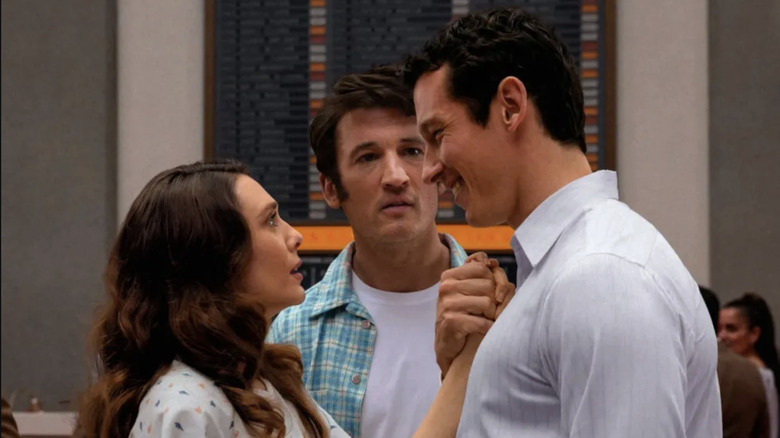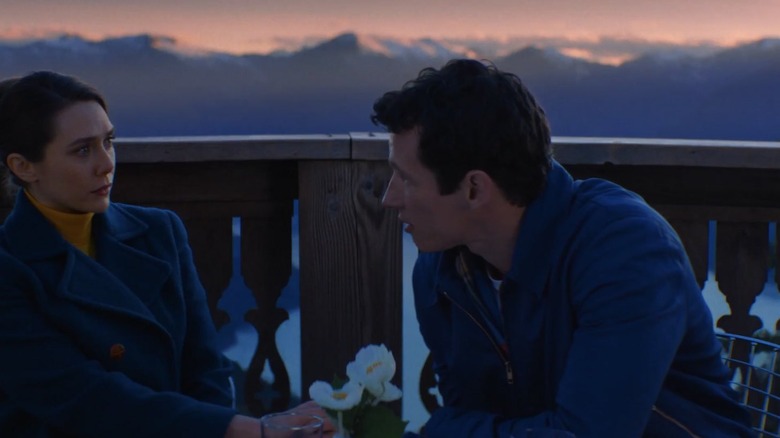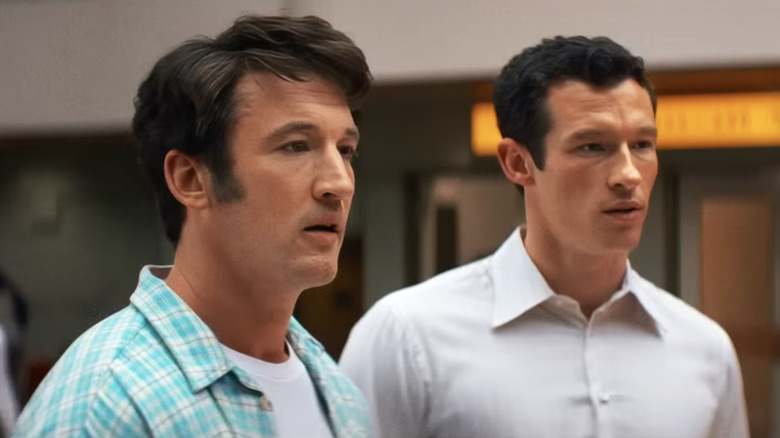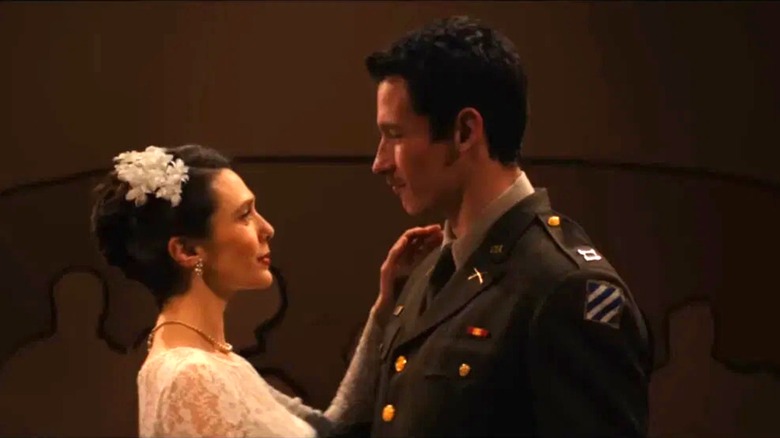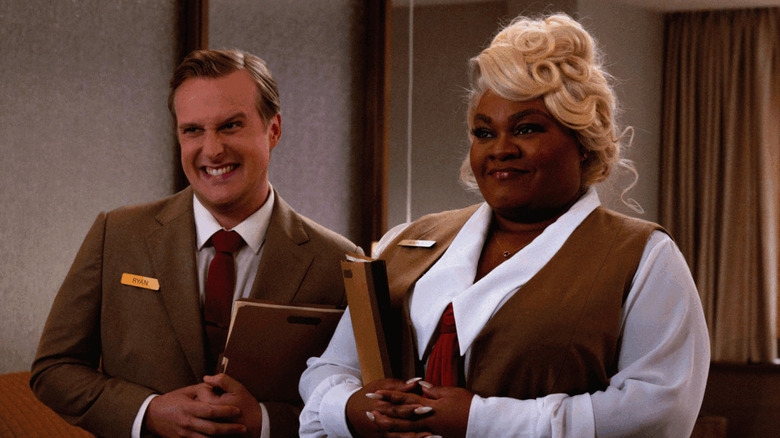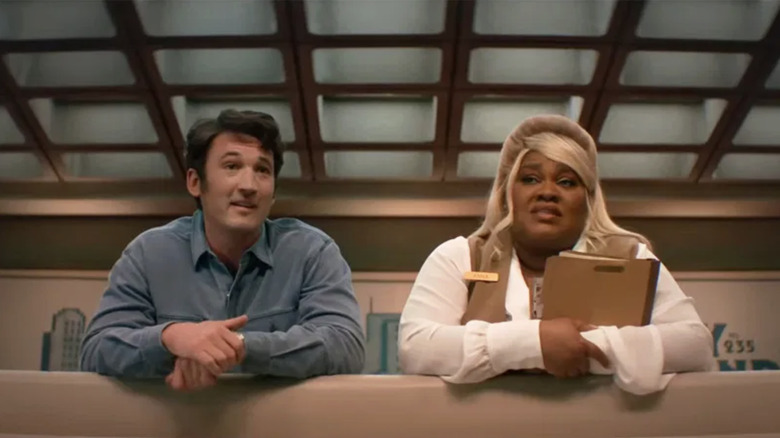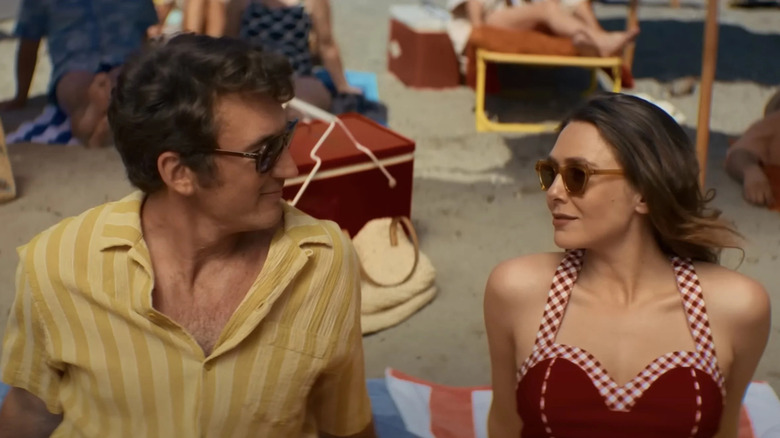Eternity Director David Freyne Wants People To Argue About His Movie [Exclusive Interview]
There's a lot of cultural pressure built up around romantic relationships. After all, romantic partners are often spoken about in terms of the person you're going to spend your life with. What if that latent tension isn't dissipated after death, but it actually becomes compounded, and the decision evolves into who you're going to spend eternity with? That's the premise of "Eternity," the new afterlife rom-com from director/co-writer David Freyne and co-writer Pat Cunnane. The film follows Larry and Joan Cutler (Miles Teller and Elizabeth Olsen) who find themselves in a realm called the Junction, an endless resort hotel area, after they've passed away. The idea is that everyone is supposed to choose a particular themed world where they'll spend the rest of eternity, and once one is chosen, it can't be changed. Things become extra complicated when Joan learns that her first husband, Luke (Callum Turner), who died before she married Larry, has been waiting 67 years for her arrival.
That's one heck of a metaphysical love triangle dilemma, and Freyne, along with his cast and crew, explores it with such a delightfully deft touch that it makes "Eternity" one of the most pleasant surprises of the year. On the eve of the film's release, I had the opportunity to speak with Freyne about all the creativity and affection for classic cinema that the filmmaker poured into his film. We spoke about everything from working with his principal actors, the contributions of Da'Vine Joy Randolph and John Early (who play the film's Afterlife Coordinators Anna and Ryan), the influences from Old Hollywood and '90s indie films, and how he and his design team came up with such a distinctive look for the afterlife.
Note: This interview has been lightly edited for clarity and brevity.
Freyne sought to keep the movie sincere in its tone
I was really struck by how much this movie feels genuinely like a classic Hollywood melodrama. I saw some Capra in there, some Lubitsch, some Wilder, Powell and Pressburger. Let me know if I'm missing any.
No, I love it. I love it.
But in keeping it in this sort of genre, how did you approach rooting it in such a recognizable reality, but not let it slip into an easy cynicism? Because I think that's the ultimate poison for making a classic melodrama these days, is that we're all so aware of the world outside and how bad things can get and everything like that. This movie feels real throughout, but it never goes into despair, because it's a movie about death, too.
Absolutely. I mean, I love sincerity in film. I think we don't have enough of that, and I think that's something that people, those greats like Billy Wilder or Sturges or Lubitsch, they had that. And I really wanted to bring that spirit to this film. And you're right, it's set in the afterlife, but for me, it's really an exploration of life. It's an exploration of what we consider love and happiness, and we always kept that as the essential truth throughout the making of the film, in talking with the actors and working with everybody. So we always just brought it back to that question of what would you choose and what is happiness or love to you? And I think that helped never going into something cynical. That always rooted the film for us. It's all about, it's a big afterlife. It is otherworldly, but it's always rooted in Joan's dilemma between these two men and what she would choose between these very two different great loves that she had. So that was always what we came back to, and hopefully that keeps it sincere and joyous.
Eternity keeps people guessing about the film's love triangle
In the same vein, in terms of your balancing of tone, this is also at its core a film about a love triangle, and your three leads, they're all so wonderful. Obviously they do a lot of the heavy lifting, but on your end, I was curious how you balanced this love triangle so that the outcome of it never feels predictable or obvious, because it really didn't to me.
Good. I mean, I love that. I really wanted people guessing, and I really want people — frankly, I want people arguing. I want people thinking that she made the wrong choice or the right choice, or maybe she should have gone to fake Paris with her friend Karen. I want people discussing that. I think you want to keep that as a surprise, and we wrote it as best we could, but that really comes down to this incredible, incredible cast and how brilliant they are together. I think you feel the genuine love between both Larry and Joan and Luke and Joan, and I think that helped keep the audience guessing. It was always important to me that there's no villain, there's no right or wrong answer to this. That the love she had with Luke was great and beautiful, and the love she has with Larry is great and beautiful, and they're such different types of love at such different points in her life. And Joan says it at one point, "how lucky am I to have had you both." I think that was always the most important thing to me: that there is no right or wrong answer. No matter what happens, somebody's going to be heartbroken, and you have to allow that to exist and, yeah, there's no easy out. And I think that makes the ending feel so emotional and so great when it actually comes. Even though it shouldn't be expected, it should feel right.
'It's really important to feel that the author knows the rules'
When you were writing this with Patrick, did you two have an "a-ha" moment or something similar which freed you from the burden of too much world-building? Because with a fantastical premise like this, you could get in the weeds of how it all works. Did you have to go through a lot of drafts?
Yeah, we spent a long time, we worked out the rules of the world. We had a science for the whole thing. There's a moment in the script where Anna kind of explains it. We both loved it, but it always affected the flow. And there's that thing, I mean, I'm such a huge fan of science fiction writing, and I think the best sci-fi, it's really important to feel that the author knows the rules. You don't need to know the rules, but you need to know that it exists and that it's been thought through. We just had the confidence that this world does work. We have a science for it, we have a logic for how this works. And I think the audience feels that without being told that. We kind of just came back to that at every point.
And again, it's all about the characters in this world. It's all about that decision. So much of the world-building and the rules of the world are in the background. They're in the announcements, they're in the sets, and I think we let that do the talking in terms of the rules, so to speak. Yeah, there was definitely a moment, I remember talking to Pat when I was in the edit and ringing him going, "I don't think this explanation fits the flow. But it's great." And then he was like, "Oh yeah, no, my wife hates it. Let's lose it." I was like, "Okay, well, if she doesn't like it, it's gone." But yeah, I think as long as people feel it makes sense, that's the most important thing. I never want to take away from what Joan, Larry, and Luke are going through.
How Freyne and his actors collaborated and inspired each other
Well, with all that in mind, was this a set that you welcomed improv on, or were you keeping things tight to the script?
We kept it tight to the script, but I worked so much with the cast in pre-production and during production, and we spoke so much about our lives and our loves and what we consider happiness, that I love keeping the scripts open. It's a blueprint. So in response to just getting to know them, I would rewrite things and that really inspired me to add new bits or change things and they would say something that would spark me. I mean, the beautiful squatting scene, which I think is really funny and really romantic, that came from a conversation with Miles talking about how much he loved how Larry will do anything for Joan. I was like, "What could Larry do for Joan that would make her happy in that moment?" It was like, "Squatting." So there were always these little moments that just I wrote as a response to them. So even though we kept tight to the script, they really inspired that script. They really inspired the writing of it.
And then with Da'Vine and John, I just loved working with them. I wanted more time with them, so I kept writing stuff for them, writing lines for them, writing jokes for them, writing that scene, the only scene in the film where they're alone, I wrote that during production just because we needed a breath anyway in the film, and I just wanted a moment for them to question their role in this Junction, this world. That all comes from just being aware of your cast and how brilliant they are and how much they're giving you and wanting to respond to that.
I love their characters in this movie. Because we only get little kernels of their backstory, did the actors come up with a backstory for themselves or did you?
I wrote backstories for them, and I remember my very first conversation with Da'Vine is she wanted to, again, not to have it in the script, but she wanted to understand where her character came from. When she died, why she chose to stay in the Junction and work there. And it wasn't about having that detail in the film, but just for her to understand it so it's fully fleshed out and she knows how to embody this role and why this character, Anna, is maybe disenfranchised at this moment. She has this very beautiful scene with Larry where she explains why she chose to stay. Originally, that monologue was longer, and it went into [her backstory], and it was actually Da'Vine herself who said, "We don't need her to say that. We can feel it." And that was really amazing. That's what a great actor does. They don't need the lines, they just need to feel it. They need to understand it.
The architectural and cinematic influences behind the Junction in 'Eternity'
I have to ask about how you created the Junction between your entire team, your cinematographer, art director, costumes. It feels like there's, I guess I'm going to call it a resort-hotel-meets-'70s-kitsch look to it. Did you guys have an influence, particularly in terms of a designer or an era or a look that really locked you all into the same approach?
Yeah, I did a really heavy look book when I was first pitching for the film, and we kind of hewed quite closely to that throughout. But I think the big inspiration for me and Zazu [Myers] architecturally was there's the Barbican in London and the Moriyama Library in Toronto, and that became a really big influence for how we wanted this structure of the set to look. And then being surrounded by these scenic bluffs as if you're kind of in the back lot of a Powell and Pressburger film always felt like a beautiful way to create this artificial world that Luke in particular has been stuck in for 67 years.
The idea of the trade floor came to me when I was writing it — the idea of being in this chaotic, '70s-type expo where you are being hawked every type of eternity, really felt like a great kind of environment for these characters to have their dilemma. But I think visually, myself and my cinematographer, Ruairí [O'Brien], we always went back to "The Graduate" as a visual reference for the afterlife section of the film. Just how saturated it is and how dirty it is. That always felt like a great touchstone for us. And then there's Jacques Tati's "Playtime," which was huge for me as well. Just combining these things to create this chaos really felt like the right approach. And then we had a very different approach for the opening of the film, which is set in the real world where we shot it on sphericals instead of anamorphics, and it had a much more washed out look to it. It almost felt more like a '90s film, which was always the way I wanted it to feel. My big reference for that was Greg Mottola's —
Greg Mottola's "The Daytrippers!" I saw that in the press notes and I freaked out because I watch that every year, it's one of my favorite films of all time.
It's so brilliant. People need to watch that more. Nearly half of it's in a station wagon and people arguing, and it's perfect. So that was the inspiration for the opening. And then we get into this much more kind of lush, cinematic world when we get into the afterlife that is really rooted in the '60s for me, in "The Graduate." And there's some brilliant Agnes Varda documentaries that were a huge inspiration to me and my production designer, Zazu Meyers, particularly her documentary "Du côté de la côte," which I think there's one or two shots that we recreated frame by frame in the beach world, just because I wanted to have my little ode to her. So there was a lot of references and there was a really strong collaboration between me, Ruairí, and Zazu, and Angus, my incredible costume designer, in how we bring this together, the palette we wanted. But making it feel grounded always, I think was important.
How Elizabeth Olsen and Miles Teller were instrumental in the casting of their older characters
I wanted to ask about the Earth side of this movie, in terms of starting the film with Barry Primus and Betty Buckley, and I was curious if you did those scenes earlier in the schedule or later in the schedule. I didn't know if Elizabeth and Miles were going off of them or vice versa in terms of building the same characters.
We shot them at the end. It was really important to me that Miles and Lizzie didn't feel like they were doing a caricature of other characters. So actually they were really involved in the casting. I always showed them tapes, and so they knew where they were going to end up. And Miles in particular was really inspired by Barry's voice, so he really brought [that] to Larry. But what we ended up doing is Lizzie and Miles kept doing voice notes in character, just saying anything random and sending it to Betty and Barry so they could get their voices right for it. And then I would send them kind of assemblies of scenes during production, so they could see how Miles and Lizzie were interacting, and any kind of mannerisms they could bring to it. So it was actually quite collaborative.
It was Barry's — Barry Primus is a genius. It was his idea for Larry to have a hearing aid and to take it out when he's young in the train. That was Barry. That was his idea. And Miles was like, "That's brilliant." So it was a lovely kind of back and forth, and I think it's such a gift for me to have Betty Buckley, who's, if you're into musical theater or gay, she's an icon. And Barry, who's an absolute icon and has the best stories and is always talking about people like Marty. And I'm like, "My friend Marty's a teacher. Yours is Scorsese." So yeah, it was a gift to have them. And I think the way they opened the film, you instantly feel this love that's kind of built over 65 years. The way they have this ease and the way they bicker, that just sets the film up so amazingly. Then when we get to Miles and to Lizzie, you know, you instantly understand where they are. So yeah, it was a really collaborative, fun process with all four of those actors and myself. It was great. And they all just did an extraordinary job.
"Eternity" is in theaters now.
